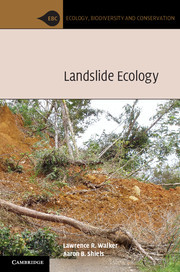Description
Landslide Ecology
Ecology, Biodiversity and Conservation Series
Authors: Walker Lawrence R., Shiels Aaron B.
Landslides are dangerous, fascinating phenomena: understanding their biological and ecological aspects is essential for achieving slope stability and habitat restoration.
Language: English
Subject for Landslide Ecology:
Approximative price 63.71 €
In Print (Delivery period: 14 days).
Add to cart
Landslide Ecology
Publication date: 12-2012
314 p. · 15.1x22.8 cm · Paperback
Publication date: 12-2012
314 p. · 15.1x22.8 cm · Paperback
Approximative price 114.03 €
In Print (Delivery period: 14 days).
Add to cart
Landslide Ecology
Publication date: 12-2012
314 p. · 15.8x23.6 cm · Hardback
Publication date: 12-2012
314 p. · 15.8x23.6 cm · Hardback
Description
/li>Contents
/li>Biography
/li>
Despite their often dangerous and unpredictable nature, landslides provide fascinating templates for studying how soil organisms, plants and animals respond to such destruction. The emerging field of landslide ecology helps us understand these responses, aiding slope stabilisation and restoration and contributing to the progress made in geological approaches to landslide prediction and mitigation. Summarising the growing body of literature on the ecological consequences of landslides, this book provides a framework for the promotion of ecological tools in predicting, stabilising, and restoring biodiversity to landslide scars at both local and landscape scales. It explores nutrient cycling; soil development; and how soil organisms disperse, colonise and interact in what is often an inhospitable environment. Recognising the role that these processes play in providing solutions to the problem of unstable slopes, the authors present ecological approaches as useful, economical and resilient supplements to landslide management.
Preface; 1. Introduction; 2. Spatial patterns; 3. Physical causes and consequences; 4. Biological consequences; 5. Biotic interactions and temporal patterns; 6. Living with landslides; 7. Large scales and future directions for landslide ecology; Glossary; References; Index.
Lawrence R. Walker is a Professor of Plant Ecology at the University of Nevada, Las Vegas. His research focuses on the mechanisms that drive plant succession, particularly primary succession on volcanoes, landslides, glacial moraines, floodplains, dunes, mine tailings and abandoned roads. His landslide research has involved field work in Alaska, Hawaii, Puerto Rico and New Zealand.
Aaron B. Shiels is a postdoctoral research associate with the USDA National Wildlife Research Center in Hilo, Hawaii. His research is focused on understanding the local and large-scale impacts of disturbance and invasive species on plant communities and ecosystems. He has worked on landslides in China, Hawaii and Puerto Rico.
Aaron B. Shiels is a postdoctoral research associate with the USDA National Wildlife Research Center in Hilo, Hawaii. His research is focused on understanding the local and large-scale impacts of disturbance and invasive species on plant communities and ecosystems. He has worked on landslides in China, Hawaii and Puerto Rico.
© 2024 LAVOISIER S.A.S.

